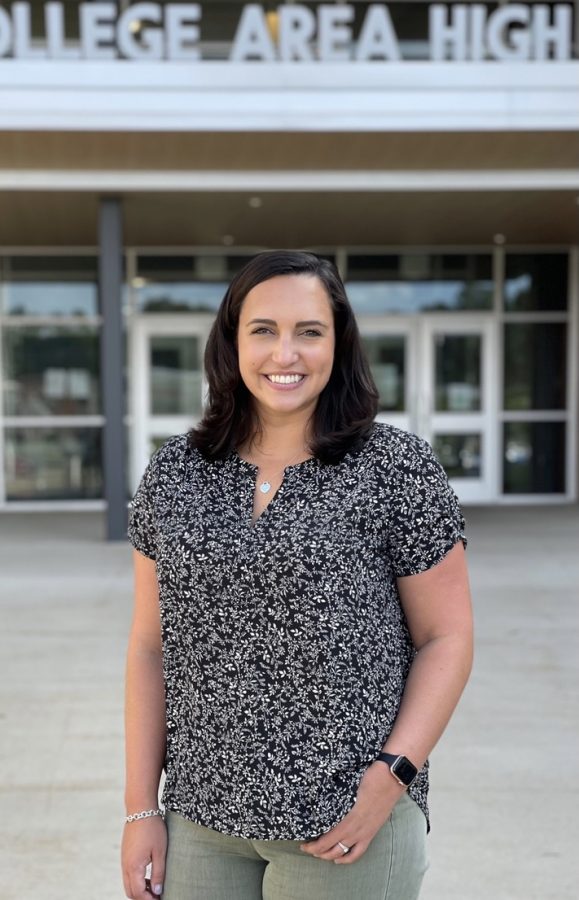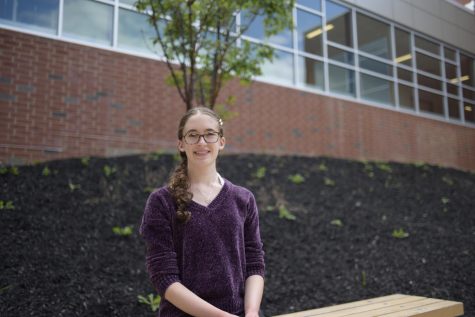Meeting the Mental Health Moment: Elisabeth James
Photo Courtesy of Elisabeth James
Mrs. Elisabeth James poses in front of State High for a professional portrait. James joined the Office of Equity and Inclusivity as the State College Area School District’s first-ever mental health clinician for the 2021-2022 school year.
September 21, 2021
The door to Mrs. Elisabeth James’ office is always open. When students walk into the cozy, welcoming space, they are greeted by a pair of comfortable teal chairs well-suited for meaningful conversation, geometric-print artwork on the wall, and a warm smile from James that can be sensed even through a mask.
Located in the Office of Equity and Inclusivity in C037, James is the mental health clinician for the State College Area School District (SCASD), a position new to the district this year. In May 2021, James, a State High alumna herself, finished graduate school at Penn State University (PSU), earning her Master’s in Counselor Education with an emphasis in clinical mental health in schools and communities. As a resource for students districtwide, she is making strides to address the ever-timely issue of mental health.
“It’s really exciting to be able to have a position that’s so needed right now, given the current pandemic and [having been] on Zoom all of last year,” James expressed. “Anxiety, depression, suicidal ideation—everything is really increasing from people being alone for so long. And not only that, but you’re also seeing worries about being with other people, worries about health, worries about safety, and risk. You’re also seeing more death, and grief, and loss. There’s just so much going on right now that this is a perfect time for this position.”
One duty of James’ job includes providing free, individual counseling sessions. She also plans to implement group counseling alongside events related to mental health. James is available to help students struggling with anything from mental health challenges like anxiety and depression, to academic issues such as procrastination, to relationships, identity, and more.
James hopes that the presence of counselors and a mental health clinician in State High will reassure students that they have a safe place to turn to if they need to talk. Students can access James’ support, expertise, and understanding nature by expressing that they are interested in seeking mental health services to their school counselor, who will then submit a referral.
“Maybe [students are] going through a lot of different things in their life and they just don’t know what to do, who to turn to, and how to process,” James said. “Maybe they don’t have the right coping mechanism, so when in counseling, a lot of the work that’s done is to help sort through those challenges that students face, overcome them, and develop positive ways to cope with things that happen.”
While James can help teach about coping mechanisms and strategies, her favorite part of her job is witnessing the ‘aha’ moments when her clients begin to think metacognitively on their own and come to better understandings of themselves.
“Sometimes they cry, and sometimes they laugh, and it really just clicks in their eyes, and they’re like ‘That’s so important in my life!’ and that’s what they take with them forever. I love those moments,” James said, reflecting on her clients’ eureka moments.
Stepping outside of State High, the need for mental health support positions catered to supporting kids and teens is critical across the United States. According to the National Institute of Health report, National Trends in Mental Health Care for US Adolescents, mental illnesses such as depression have risen in prevalence among adolescents in recent times.
The COVID-19 pandemic has only exacerbated this trend, as demonstrated by Challenge Success study Kids Under Pressure: A Look at Student Well-Being and Engagement During the Pandemic. The study found that only one third of students feel “quite or very confident in their ability to cope with stress.”
James is well aware of the academic and pandemic-induced stress that students and teachers alike experience at State High and nationwide, acknowledging that it is normal for big changes (such as coming back to fully in-person learning) to breed anxiety.
“[Having the entire student body in-person is] going to send anybody into some worry and some nerves, given that we haven’t been in situations like this for so long,” James noted. “It’s been a year and a half, almost two years of being in a pandemic, so having that in mind, it’s no wonder some people are struggling with this, and it’s really important to be there for them, and have [students] know that they can go to their counseling office, […] or if they need more support, they can come to me.”
One aspect of James’ job may seem counterintuitive at first: she falls under the Office of Equity and Inclusivity (OEI) rather than the counseling office. What differentiates James—a mental health clinician—from school counselors, is more than a title. James is solely dedicated to supporting students’ mental health, while counselors primarily assist students with planning their high school careers and futures. She pointed out that though students’ mental wellbeing is important to counselors too, no one person can do it all, so having a separate role fully focused on addressing mental health concerns opens up dedicated time and space for students who need it.
James’ placement in the OEI was intentional, and she finds it appropriate to house a mental health clinician under this office.
“This is a new chapter where people need their mental health rights to be advocated for. Just like we think about equity and inclusivity being about including people of different ethnicities, races, and abilities, we also have to think about mental health,” James explained, adding that when students’ mental health affects their life and ability to succeed in class, they need to be provided with equitable opportunities.
One benefit of in-school counseling and mental health resources is accessibility. Sessions with James are free and take place in her C037 office, which removes financial and transportation barriers for students seeking help. After eight sessions, students’ cases are evaluated to determine the next best steps: either referring to community resources or continuing treatment with James.
Additionally, providing counseling services in schools allows mental health clinicians like James to take a holistic approach to support students. James noted that students’ academics, athletics, extracurriculars, home life, and mental health are all interconnected, and almost all of these dimensions are affiliated with educational systems. Moreover, much of students’ stress stems from school performance and social life. A TeensHealth survey about back-to-school stressors found that one third of students are most anxious about schoolwork, with anxiety about fitting in, being judged, and appearance following close behind.
“People don’t function in bubbles; […] everything works together,” James said. With this understanding in mind, James noted that working in a school allows her to bring together many facets of students’ lives while still protecting clients’ confidentiality, ensuring that parents, teachers, coaches, and more are all on the same page and there to support the student.
“When someone’s mental health is not where it should be or is suffering, they can’t do their best in school, they can’t do it academically [or] athletically, because mental health must come first,” James emphasized.
James is not alone in tackling the issue of mental health in the school district; about ten Penn State interns working toward their master’s degree or doctorate joined the counseling team and will be available to see clients of all grades. In addition to bringing in more mental health specialists, SCASD has connected with the Penn State Psychological Clinic, where PSU graduate students provide therapy to Centre County residents.
Many more mental health resources are up-and-coming at State High. In the future, James sees a potential LGBTQ youth support group forming, an increase in education surrounding mental health and simple grounding techniques, and the development of paper resources and handouts, to name a few.
Another of the initiatives James hopes to lift off the ground is called Mindful Mondays, an idea born out of the understanding that the beginning of the week can be stressful. Coffee and donuts will be provided in the State High My Mental Health Matters space (C046) for students and teachers to enjoy while sitting together and taking a moment of mindfulness on a Monday morning.
”I’m really trying to build that community and increase the awareness of mental health as much as we possibly can, because the more you talk about it, the easier it is,” James commented.
James believes that community-building and communication are the keys to reducing mental health stigma at State High. She emphasized that mental health and counseling should not be seen as a source of shame or embarrassment.
“People go to counseling because they want to work on themselves and become better,” James said. Viewing the stigma surrounding mental illness from a scientific, matter-of-fact standpoint, she added, “Anxiety is a chemical imbalance in the brain, just like depression, just like diabetes. You wouldn’t say, ‘Don’t get insulin,’ right? You wouldn’t say, ‘Don’t treat your broken foot at the doctor.’ If some things are going on inside your body chemically, you should treat [them], and there’s no shame in that.”
With continuing conversations, education, and the growth of the school district’s mental health team, James is optimistic for the future of mental health resources and support at SCASD. “The only place to go [from here] is up,” she declared.
Out of the many mental health tips and practices up her sleeve, James shared the importance of breathing and self-care.
“People underestimate the power of breathing. Your breathing can really trick your mind, […] [but with meditative breathing], you can train your mind to let you know that you’re okay,” James said.
James recommends the 4-5-6 pattern of breathing, which slows rapid, shallow breaths, a symptom of anxiety. To practice this, one inhales for the count of four, holds their breath for the count of five, and exhales for six counts. Conveniently, this technique can be used anytime, anywhere. As for self-care, James echoed a well-worn piece of advice: “Give yourself time to do something that makes you happy.” She noted that the simple act of taking time for oneself is often overlooked, but can make worlds of difference in a person’s mental wellness.
As the 2021-2022 school year unfolds, James hopes to be a voice of support and reassurance for everyone navigating uncharted waters. “I know this year has its challenges, but I challenge you also to rely on those around you. Rely on your teachers, rely on your peers,” James said. “We lived alone for a while, but we’re not alone. And you’re not alone.”



